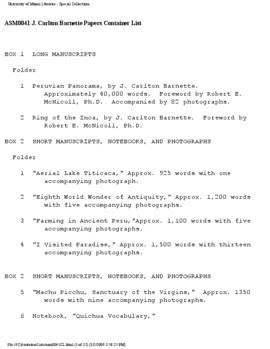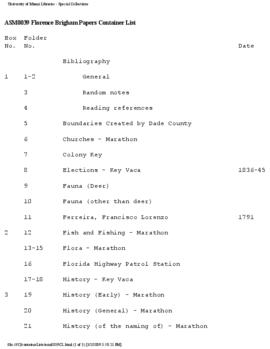"Archive of letters between members of the Michelsen and Havens family, including correspondence from Kate C. Havens, a prominent female theosophist from Miami, Florida and Cloudland, Geogia. Approximately 75 letters plus newspaper clippings, ephemera, and a sketch book containing costume designs by Cleo Michelsen. The majority of these letters are addressed to Cleo Michelsen, a young lady, who is interested in the arts and would eventually marry Auriel Bessemer, a noted muralist of the New Deal. Cleo came from a well-established family from Miami. The letters are written from her brothers, sisters, parents, and grandparents. The family is well-educated, and the letters are articulate and well-written.
However, with the Depression looming over the country, her family is is in the midst of a crisis. Cleo's father has seen his business fortunes plummet, and he and Cleo's mother have separated. Her father eventually moves to Cuba where he attempts to revive his holding company. Her mother stays in Florida but is in terrible financial straits. One of Cleo's sisters writes regarding the lack of money and her mother's impoverished state - one which forces her to go days without eating.
In addition, as mentioned above, Cleo has been courted by Auriel Bessemer, who she meets in art school. A promising artist himself, they go on to marry in 1935. During the New Deal, Auriel was commissioned by the Treasury Department to create seven murals - "Historical and Industrial Scenes - Sketches of Virginia," for the first federal building in Arlington. The murals were conserved in 2007, and today, they remain in their permanent home in the U.S. Post Office Building in Arlington.
Most importantly, in this collection are a series of letters from Cleo's grandmother, Kate C. Havens, who splits her time between her home in Miami, Florida and a mountain retreat in Cloudland, Georgia. Mrs. Havens originally hailed from Chicago and was a prominent voice in the Theosophy movement of the time, delivering lectures, writing articles and becoming acquainted other notable theorists, including Anne Besant and Max Heindel. In Miami, she continued her involvement with Theosophy becoming the president of the newly formed Theosophical Society there in 1919. She was a free and very liberal thinker and also became heavily involved in the Women's suffrage movement, eventually becoming an officer on the legal status of women in the Florida State League of Women Voters.
Havens has a great affection for Cleo and writes her interesting heartfelt letters, which are mostly always infused with a Theosophical bent, injecting her views on spirituality and orientalism, providing her opinions on important theosophical readings, reporting upon her lectures given to the Theosophical Society in Miami, and giving accounts of two fascinating meetings with Pearl Buck and Dr. Alvin Kuhns." -Denning House Antiquarian Books & Manuscripts




